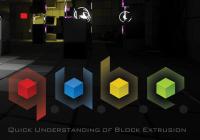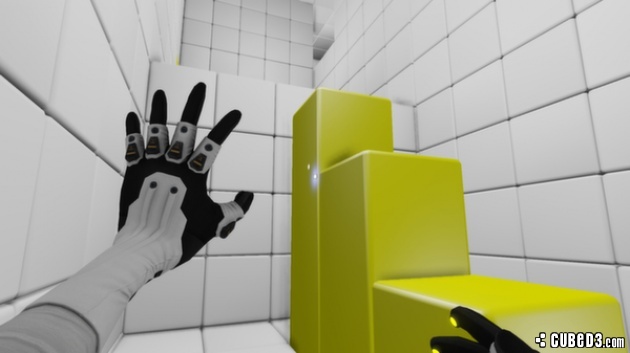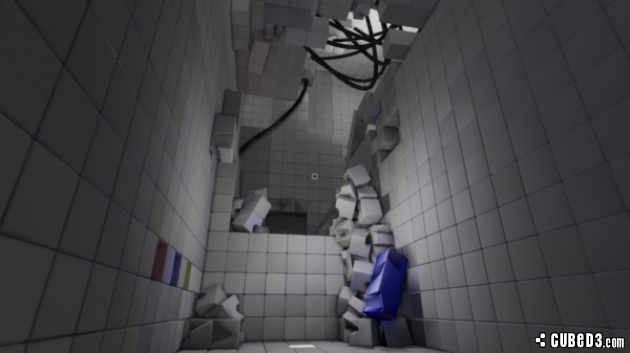Q.U.B.E. (PC) Review
By Jordan Hurst  04.11.2014
04.11.2014

Q.U.B.E. has earned itself a reputation for being a poor man's Portal, which is fitting, but sounds like a harsher criticism than it is. After all, if a game is going to be a poor man's anything, Portal is one of the best possible subjects for imitation. That said, the comparison is actually pretty shallow; the only thing the two games have in common is that they are both first-person puzzle games set in sterile-looking environments. The game mechanics of Q.U.B.E. are significantly different, instead focusing on several types of colour-coded blocks whose unique properties must be manipulated by the player in order to reach each area's exit. For the most part, this gameplay works wonderfully. The only problem is that it exists in a vacuum; despite constant hints to the contrary, Q.U.B.E. is about nothing more than cubes. With Q.U.B.E. Director's Cut due on Wii U eShop soon, Cubed3 looks back at the original PC version to see what has been missed so far.
Fortunately, it turns out these particular cubes make for some decent entertainment. The first hour or two of Q.U.B.E. is exceptionally smooth, with effective silent tutorials and clever puzzle solutions, all accompanied by a wonderfully subtle ethereal soundtrack. It slides into a pleasant sweet spot between relaxation and mild mental stimulation that's rarely reached successfully. As the game progresses, the puzzles begin to incorporate physics objects that must be guided to their destinations using cubes, wires that can activate broken cubes, and magnetic panels...that affect cubes, naturally.
Repetitive as it might sound, the fact that every new mechanic ties back to the core cube-controlling is their greatest strength. It allows the game to feel like a cohesive whole rather than a series of unrelated elements pieced together in the hopes that they will add up to a decent play time. Conversely, this kind of grounded expansion allows for a fair amount of variety despite the reliance on an unchanging core mechanic. Unfortunately, as the gameplay expands, some stretch marks begin to develop. In particular, the game's midsection seemingly runs out of ideas, and simply reiterates previous puzzles with cheap modifiers (puzzles in the dark, puzzles with swappable cube positions), and two magnet-based conundrums near the end form a massive difficulty spike that's rather jarring since the rest of the game barely reaches middling difficulty.

These are minor issues, but the game really stumbles when it tries to contextualise its puzzles. In the same way the gameplay lands in a positive sweet spot, the "story" lands in a negative one, where there's just enough intrigue to capture players' curiosities, but no actual plot for the game to follow through with. There are constant indications that there's something more to the events happening just off-screen - the environment will occasionally shift in unnatural ways, the level design feels like it's hiding secrets, and there are cut-scenes where the protagonist showcases human behaviour - but it never amounts to anything beyond "Cubes are cool."
The ending is essentially a giant shrug; it massively expands the scope of the setting, but instead of surprise, the only reaction it elicits is a disappointed, "And...?" It's like playing Braid without the princess scene or the Oppenheimer quote, or perhaps more appropriately, it's like if Portal actually ended with the player's incineration. "Open to interpretation" can be a valid narrative style, but if it's going to work, players need to be given something to interpret.
The rest of the game is, depending on how charitable one feels, either lazy or pragmatic. It's probably closer to the latter; the developers are game designers first and foremost, not artists or programmers, so it's both forgivable and thematically appropriate that nearly the entire setting is composed of simple cubes that almost exclusively serve the gameplay. Additionally, despite their simplicity, it cannot be denied that the game's graphics are visually striking. The simplicity is also an asset to the game's controls, which are both smooth and natural. Interestingly, the movements of the game's physics objects seem to be slightly restricted to work in the player's favour, which is an immensely appreciated feature, given how frustrating puzzle games with fiddly physics engines can be.

Cubed3 Rating
Good
It's worth noting that developer Toxic Games has recently released a Director's Cut of Q.U.B.E. that supposedly fills in the abyss where the game's narrative should be. It's possible this new version will remedy the game's issues, but for now, Q.U.B.E. is a pleasant, mildly entertaining diversion - nothing more, nothing less. If it wasn't for its use of scripted sequences and the Unreal engine, it would be regarded in the same vein as a high-quality browser game, and there's nothing wrong with that. It's just disappointing given the higher status the game hints at attaining. It's not the Portal rip-off it's often accused of being, but it is ultimately faceless. It only has an identity in the same way an atheist has a religion.
Comments
Comments are currently disabled

 Sign In
Sign In Game Details
Game Details
 Out now
Out now  Out now
Out now  None
None  Out now
Out now  Subscribe to this topic
Subscribe to this topic Features
Features





 Top
Top

